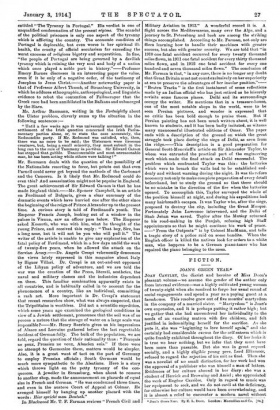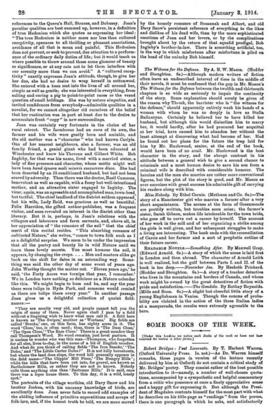FICTION.
JOAN'S GREEN YEAR.* Jour CANTLEY, the diarist and heroine of Miss Boon's pleasant volume—we assume the gender of the author only from internal evidence—was a highly cultivated young woman of twenty-eight when she resolved to forgo her usual round of social engagements and spend a year as a paying guest at a farmhouse. This resolve grew out of five months' martyrdom in the company of a married sister. " Martyrdom " its Joan's- own expression, and it is perhaps putting it rather high; but we gather that she had surrendered her individuality to the needs of an exacting matron with five children, and felt justified in indemnifying herself for the sacrifice. As she puts it, she was "beginning to love herself again," and she certainly had considerable excuse for the self-esteem which is quite frankly exhibited throughout the diary. Of her looks it is true we hear nothing, but we infer that they must have been more than passable. But she was in great request socially, and a highly eligible young peer, Lord Elksmoor, refused to regard the rejection of his suit as final. Then she was a novelist of no small distinction, for her work had won the approval of a publisher who was himself a man of letters. Evidences of her culture abound in ber diary: she was a student of Herrick and Browning and Amiel ; she appreciated the work of EtiOne Carriers, Only in regard to music was her equipment to seek, and we do not cavil at the deficiency, for otherwise her culture would have been overwhelming, and it is almost a relief to encounter a modern novel without • Joan'. Onma Year. By E. L. Boon, London: MoomIllaa and Co. [IL) references to the Queen's Hall, Strauss, and Debussy. Joan's peculiar qualities are beet summed up, however, in a definition of true Hedonism which she quotes as expressing her ideal : " The true Hedonism is neither more nor less than cultured receptivity, openness to all thrilling or pleasant associations, avoidance of all that is mean and painful. This Hedonism does not prevent, or seek to prevent, due attention to a perform- ance of the ordinary daily duties of life ; but it would teach us where possible to throw around these some glamour of beauty or significance, or at any rate not to let them interfere with our serenity more than we can avoid." A " cultured recep- tivity " exactly expresses Joan's attitude, though, to give her her due, she had no desire to wrap herself in cottonwool. She entered with a keen zest into the lives of all around her, simple as well as gentle; she was interested in everything, from salting and curing a pig to point-to-point races or the vexed question of small holdings. She was by nature eimpatica, and invited confidences from everybody—admirable qualities in a novelist, for we cannot altogether rid ourselves of the belief that her rustication was in part at least due to the desire to accumulate fresh "copy" in new surroundings.
Joan was certainly very fortunate in the choice of her rural retreat. The farmhouse had an aura of its own, the farmer and his wife were gently born and amiable, and the old mother was a " character " who had known Carlyle. One of her nearest neighbours, also a farmer, was an old family friend, a genial giant who had been educated at Winchester and knew his Thoreau and Gilbert White. Bob Ingleby, for that was his name, lived with a married sister, a lady of fine presence and character, whose motto might well have been head ignara malt miseris suceurrere disco. She had been deserted by an ill-conditioned husband, but had not been soured by adversity. Then there was the doctor, Basil Cameron, benevolent as well as capable, with a fussy but well-intentioned mother, and an attractive sister engaged to Ingleby. The vicar, again, was an agreeable and accomplished man, town-bred but tactful. The chief landlord of the district seldom appeared, but his wife, Lady Reid, was gracious as well as beautiful. Felix Harridon, the gifted author-publisher, was a frequent visitor, and soon revealed an interest in the diarist other than literary. But it is, perhaps, in Joan's relations with the villagers and labourers and farm servants, and, above all, in her appreciation of "the romance of the soil" that the chief merit of this recital resides, "This absorbing romance of cultivated Nature," she writes, "comes to town folk such as I as a delightful surprise. We seem to be under the impression that all the poetry and beauty lie in wild Nature until we learn these lovely secrets. You most humour the soil, it appears, by changing the crops. . . . Men and masters alike go back on the shift for dates in an astounding way. Some- thing was said the other day of some event of years ago. John Wadley thought the matter out. Eleven years ago,' he said, 'the Forty Acres was turnips that year, I remember.' We in London have nothing so delicious as a Nature calendar like this. We might begin to hum and ha, and say the year there were tulips in Hyde Park, and someone would remind us there are tulips there every year." In another passage Joan gives us a delightful collection of quaint field- names :— "They are mostly very old, and people cannot tell you the origin of many of them. Never again shall I pass by a field without a lingering wish to know what men call it. A field here is known as 'The Swipes; another as Wootans: Big fields are called 'Brooks,' one, on this farm, has eighty acres in it. The word 'Close,' too, is often used; thus, there in 'The Dam Close,' The Open Close," The Barn Close.' There is a great meadow they call Thompson's Wood. No wood remains, just level pasture. It is useless to wonder who was this man—Thompson, who forgotten for all else, lives to-clay, in the name of a bit of English meadow. And what do you think of calling fields The Iron Snacks," The Doles,' and 'The Little Carter Doles ? ' It is not hilly hereabouts, but where the land does slope, the word hill generally appears in the field name—. The Clippin' Hill Piece; 'The Hungry Hills': while the hills that have been cut into, for gravel, are known as Bartholomew Hine, or rather they are not so known. Nobody cells them anything else than • Bartomer Hills.' It is said, once there was a leper house there. To this day, it is a wild, lonely spot."
The portraits of the village worthies, old Davy Snow and his brother Joshua, with his uncanny knowledge of birds, are excellently done. Joan never fails to record odd examples of the abiding influence of primitive superstitions and scrape of folk-lyre, and, if the honest truth be told, we are more moved by the homely romance of Susannah and Albert, and old Davy Snow's persistent reference of everything to the likes and dislikes of his dead wife, than by the more sophisticated emotions of Joan and her lovers, or by the complications brought about by the return of that squalid prodigal, Bob Ingleby's brother-in-law. There is something artificial, too, in the way in which misfortune after misfortune is piled on the head of the unlucky Bob himself.



















































 Previous page
Previous page